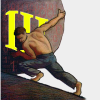...This isn't complicated. Let's say we have a crowded theater. And let's say I exercise my seemingly enumerated First Amendment right and shout the word "Fire!" And let's say that several dozen people are grievously injured in the ensuing chaos. (Let's further assume that many of these people are recipients of generous, reliable Medicare benefits, so the state bears a cost.)
The fact that this situation is so preposterous is exactly why the law prevents it from happening: courts have created common-law doctrines like "fighting words" and "clear and present danger" for the obvious reason that the exercise of a right can have dire consequences, and some consequences are too costly to bear. Will might think that in this circumstance the cost is not prohibitively high, but there's nothing silly about a suggestion to the contrary.
For Clarke and all the other anti gun rights ignoramuses out there, the correct quote is "You cannot falsely shout fire in a crowded theater."
It was penned by Oliver Wendell Holmes writing for the majority in Schenk V United States (U.S. 47 1919) in which the Supreme Court unanimously ruled it was illegal to distribute fliers opposing the draft during World War I. Holmes argued this abridgment was permissible because opposing the draft presented a "clear and present danger" to the government's recruitment efforts for the war.
Misusing a clearly anti First Amendment decision in an anti Second Amendment argument reveals an ignorance of history and a lot about the real goals of the writer.

No comments:
Post a Comment
Off topic comments will be deleted. Comments with spelling or grammar errors may be deleted unless they have hoplophobic or statist content in which case they will be highlighted and ridiculed.
Note: Only a member of this blog may post a comment.